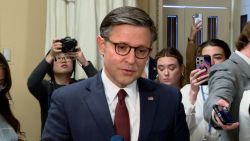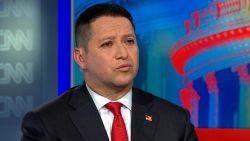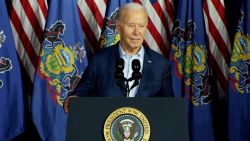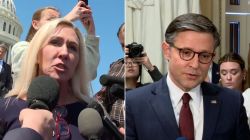House Democrats and Senate Republicans are on a collision course over policing reform, despite a bipartisan consensus that action is necessary amid nationwide protests and civil unrest in response to high-profile episodes of police misconduct.
Senate Majority Leader Mitch McConnell came out firmly against a Democratic plan to overhaul policing on Tuesday, saying that Democrats want to “federalize all of these issues. That’s a non-starter. The House version is going nowhere in the Senate.”
McConnell dismissed the Democratic proposal as “typical Democratic overreach to try to control everything in Washington. We have no interest in that.”
Senate Democrats, meanwhile, have reacted skeptically to the emerging legislation bill being that Senate Republicans are coalescing around being led by GOP Sen. Tim Scott. McConnell and Scott will introduce their bill in a Wednesday morning news conference.
Senate Democratic leader Chuck Schumer warned on Tuesday that Senate Republicans “seem to be on a path towards taking a much, much narrower, less inclusive approach – that is wrong.”
Democrats have leverage to block the Scott plan from advancing. It will need 60 votes to clear a filibuster in order to begin debate, meaning Republicans will need at least seven Democratic votes to take the measure up.
Schumer refused to say Tuesday if Democrats would seek to block the Scott plan from coming to the floor for a debate, saying “we haven’t even seen the bill yet, so it’s premature to comment,” while also declining say if he’s encouraging Democrats to avoid co-sponsoring the plan. Schumer, meanwhile, criticized President Donald Trump’s executive order on policing, calling it “weak tea.”
There is a growing sense of urgency among Senate Republicans to move ahead with police reform legislation and McConnell said Tuesday he will make an announcement Wednesday about whether he will bring the proposal to the floor ahead of the two-week July 4 recess. He said they are weighing whether to bring that bill or the defense authorization bill up before the break as the Senate works on confirming judicial nominees.
“I’ll let you know in the morning” about timing, he said. McConnell made similar remarks to GOP senators at lunch Tuesday, senators said. The Senate Republican leader McConnell also said that the Scott bill is almost finished.
GOP senators indicated on Tuesday that they believe most, if not all, of the Senate GOP conference will back the plan.
McConnell is pushing for as broad support within the Senate GOP conference as possible for the emerging police overhaul bill, two GOP sources told CNN.
That comes after tension within the Senate GOP conference on the timeline for taking up the legislation spilled out into public view.
Scott expressed concerns on Monday after some senior Senate Republicans signaled that the chamber may have to wait at least a month to take up the policing legislation, warning, “I think us waiting a month before we vote is a bad decision.”
The public display of tensions within the Senate GOP conference comes as Republicans in the chamber are locked in a high-stakes battle to keep the majority in the 2020 elections.
McConnell was asked by a reporter if he plans to stay as GOP leader even if Republicans lose the majority, assuming he wins reelection. He responded, “I do.”
Senate Majority Whip John Thune of South Dakota said on Tuesday that he believes McConnell is “very committed” to getting policing reform through the Senate, adding, “So much so that he is trying to slot it in on the next week or two.”
Sen. Steve Daines, an endangered Republican running for reelection in Montana, stopped short of embracing Trump’s executive order on police reform and said he prefers the legislative approach spearheaded by Scott.
“I’m continuing to work with Tim Scott. Tim has put together a very thoughtful proposal,” Daines said when asked if Trump’s executive order goes far enough in addressing needed police reforms.
Daines said he would like to see a bipartisan agreement reached on the issue.
Major differences between the legislative proposals from Republicans and Democrats are likely to create hurdles to any attempt to get legislation across the finish line in Congress and to the President’s desk.
The emerging GOP plan has a major emphasis on incentivizing states to take action. The Democratic plan, in contrast, has a heavy emphasis on setting national standards, such as mandates for federal uniformed officers to wear body cameras and banning chokeholds.
Scott said Tuesday that his proposal does not include an outright ban on chokeholds but argued “we get very, very close to that place” by blocking federal grant funds to departments that don’t ban chokeholds themselves.
“It eliminates the possibility of getting grants from those departments that have not banned chokeholds,” he said, describing it as “similar” to both the House Democratic plan that and Trump’s executive order. “We believe that gets you to the same outcome.”
More than 220 House Democrats have signed onto the House legislation, a strong sign of Democratic support that ensures it will pass that chamber next week.
Scott said Monday evening that he’s had talks with some Senate Democrats but said he’s been told that Democratic leadership has urged their members not to sign onto his emerging measure.
“My understanding is that the Democrats have sent the signal that they’re not allowed to get on this bill so it’ll be interesting to see how that works,” he said.
This story has been updated with additional developments Tuesday.
CNN’s Ali Zaslav contributed to this report.




















